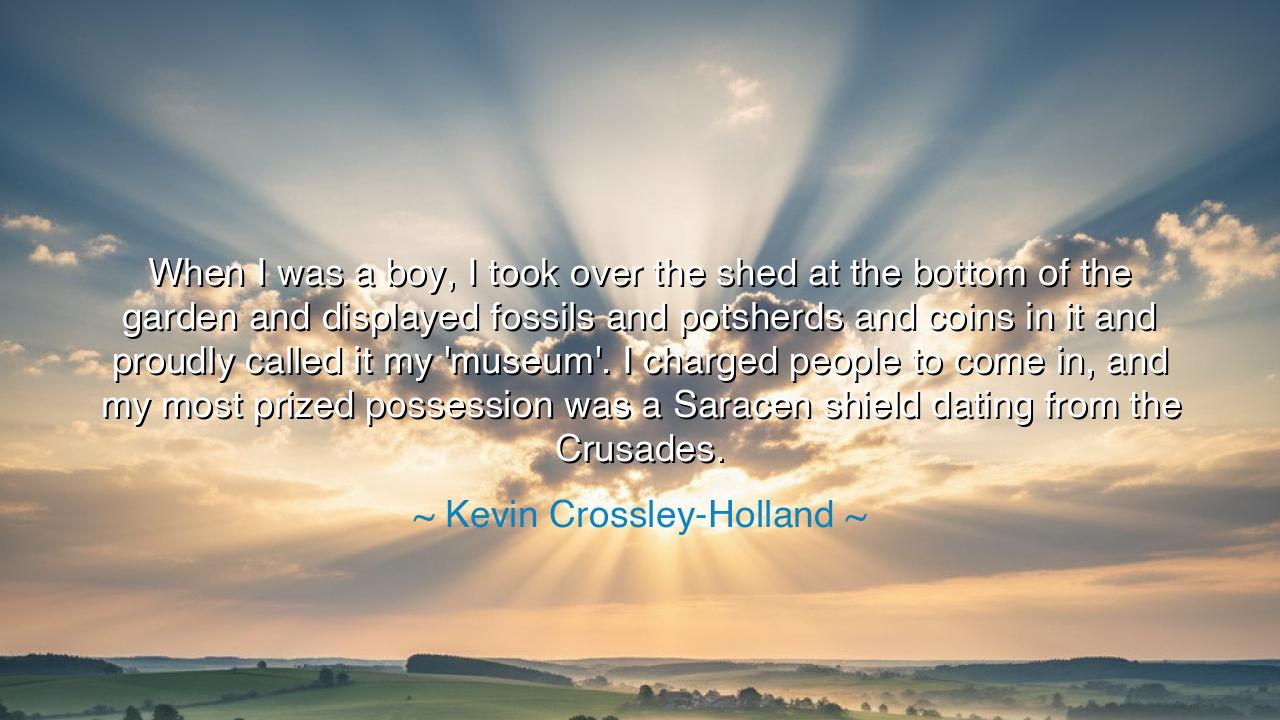
When I was a boy, I took over the shed at the bottom of the
When I was a boy, I took over the shed at the bottom of the garden and displayed fossils and potsherds and coins in it and proudly called it my 'museum'. I charged people to come in, and my most prized possession was a Saracen shield dating from the Crusades.






The words of Kevin Crossley-Holland — “When I was a boy, I took over the shed at the bottom of the garden and displayed fossils and potsherds and coins in it and proudly called it my ‘museum’. I charged people to come in, and my most prized possession was a Saracen shield dating from the Crusades.” — are not merely the recollections of a man looking back upon his childhood; they are the portrait of a curious soul discovering wonder. Beneath these gentle memories lies a profound truth: that greatness often begins in small, hidden places — in sheds, attics, and quiet corners of imagination — where a child’s curiosity becomes the seed of wisdom. His words are a hymn to discovery, to the sacred hunger of the human mind that reaches backward through time to touch the mysteries of the past.
The shed, humble and ordinary, becomes in this telling a temple of learning. To the boy Crossley-Holland, it was not merely wood and nails; it was a kingdom of dreams. Within its walls, he gathered fragments of the earth — fossils, potsherds, coins — relics of those who had lived before him. This act of collecting was not for wealth or vanity, but for reverence. He sought to preserve, to understand, to connect. His “museum” was a small act of defiance against the forgetfulness of time, a child’s way of saying: these things mattered once, and so they matter still. Such is the beginning of all history, all art, and all scholarship — not in grandeur, but in wonder.
When Crossley-Holland speaks of his Saracen shield, his “most prized possession,” he invokes a deeper symbolism. The Crusades, though wrought with blood and contradiction, remain one of history’s most dramatic meetings of cultures. To a boy, this shield was not an artifact of war, but a relic of adventure — a portal into a time of knights and fortresses, of courage and tragedy. The shield, in his eyes, protected not a warrior’s body, but the imagination itself. Through it, he touched both the violence and the majesty of human history, learning that every relic, however silent, carries the voices of both conqueror and conquered. It is this awareness — this recognition of human complexity — that would later shape him as a writer and storyteller of deep historical insight.
This love for the past, born in childhood, echoes the journeys of many great seekers. Think of Heinrich Schliemann, the archaeologist who, as a boy, read of Troy and swore to find it. The world mocked his dream as folly, yet his faith in the past’s reality led him to unearth the legendary city itself. Like Crossley-Holland’s shed, Schliemann’s quest began not in universities or palaces, but in the fertile soil of childhood wonder. For every great historian, artist, or poet begins first as a child who kneels before a stone or a story and whispers, “What came before me?” From that question, all knowledge unfolds.
Crossley-Holland’s recollection also carries a moral inheritance: the understanding that curiosity is not merely a luxury, but a sacred duty. In an age where the world rushes ever forward, his story reminds us to look backward with gratitude. To study the fossils and fragments of the earth is to remember that we, too, are part of a lineage stretching beyond measure. His childhood museum, though small, was a rehearsal for life itself — an act of stewardship, of learning to care for the treasures of time. Each object he collected whispered to him that existence is layered, and that to understand the present, one must listen to the voices buried beneath its soil.
The origin of such reverence lies in the human heart’s yearning for permanence amidst change. Every civilization has built museums, not merely to preserve beauty, but to resist forgetting. The Egyptians entombed their kings with treasures, the Greeks built marble halls for statues of gods, and the scholars of Alexandria gathered scrolls to preserve the mind of the world. In each of these, the same spirit lived that stirred in the young Crossley-Holland: the conviction that memory is sacred, that knowledge is not owned but inherited. To collect, to study, to display — these are acts of devotion, not possession.
The lesson that flows from this memory is both simple and eternal: guard your curiosity, and honor your past. In every person’s life, there is a shed at the bottom of the garden — a small place of wonder waiting to be filled. Do not neglect it. Collect your thoughts, your dreams, your discoveries, and build from them your own museum of meaning. Let every relic — whether a book, a memory, or a found stone — remind you that life is part of a grand continuum. Learn, preserve, and share, for knowledge without gratitude is emptiness, but knowledge rooted in reverence becomes wisdom.
Thus, through the innocent act of a boy displaying his treasures, Kevin Crossley-Holland reveals an eternal truth: that curiosity is the first step toward enlightenment, and that the heart that treasures the past will never be poor in spirit. Let us, then, live as curators of our own existence — collecting beauty, protecting memory, and marveling always at the sacred passage of time. For in the end, it is not the museum that sanctifies the relics, but the reverence within the soul that beholds them.






AAdministratorAdministrator
Welcome, honored guests. Please leave a comment, we will respond soon